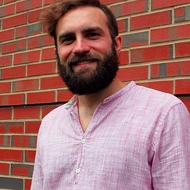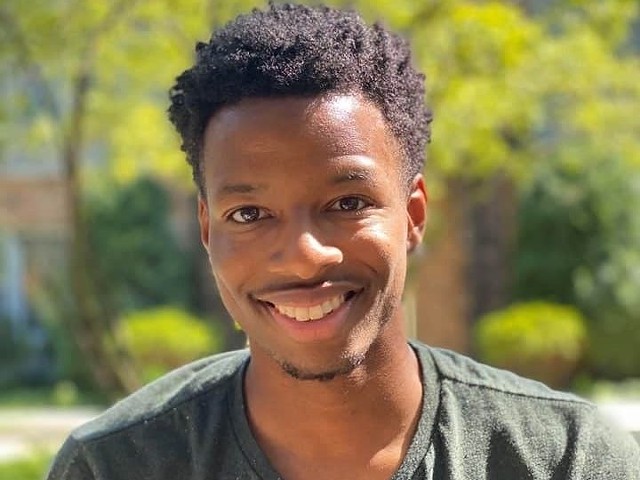For Julia Dunaway, it began with a message on Facebook from a man in uniform.
"Hello there thanks for adding me as a friend, tell me how are you doing?"
The 70-year-old living outside of Tupelo, Mississippi, saw no reason not to respond to the friendly message. They exchanged some pleasantries. He quickly proved to be one of the most intriguing men she'd ever encountered. He said he was United States Army General Stephen Townsend, currently stationed in Syria. Life in his desert outpost was difficult. He and his troops faced enemy bombardment. A fire broke out on his base. Men under his command died. Despite the duress he was under, the general was unfailingly polite in his messages. He began every post addressing her as "Madam" and ended every conversation with a Christian salutation — "I hope God allows you to have a wonderful day," or something similar.
After Dunaway and the general had gotten to know each other, he revealed to her his secret.
The general had helped a Syrian family get out of their war-torn homeland and to Canada. As a token of their gratitude, the family had told the general the location of a secret portfolio of diamonds and other riches worth $3 million, still in Syria, that he could keep for himself if he could get the valuables out of the country. The general just needed someone in the United States who could safely receive the diamonds as well as pay some of the customs and import fees. He said that if Dunaway helped pay those fees, she could keep half the portfolio for herself. This was a once-in-a-lifetime opportunity, the general said. How often are you able to help a high-ranking, highly decorated member of your country's military and get rich doing it?
Dunaway, who initially had been skeptical, asked the general how she could know for sure he was real. The general instructed Dunaway to type his name into Google.
The first result was a website for the United States Africa Command, with an official .mil address. The general was a man with salt-and-pepper hair standing in front of an American flag wearing a no-nonsense expression. If he weren't in uniform, he'd look like someone who would do a really good job filing your taxes.
"I've always been sympathetic to the military," Dunaway tells the RFT. Those sympathies, combined with the man's seemingly Christian values and his offer for a big payday, proved to be too much for Dunaway to resist.
The general put Dunaway in touch with a man he called "the diplomat." The diplomat told Dunaway his secretary worked out of an office in St. Louis and to mail the money there.
Dunaway is not a rich woman. She's been a house cleaner for the past 30 years. Before that, she worked at a jewelry store and in retail. After meeting the general and the diplomat, she became determined to do whatever she had to in order to get the $1.5 million they promised.
"I was going to give the money to my kids," Dunaway says. "My daughter and son-in-law had helped me over the past twenty years, and I wanted to give back to them. You start thinking about how you would love to do that for your kids, it just makes you foolish."
Her judgment clouded by the promise of riches, Dunaway mistook a story too good to be true for an opportunity too good to pass up and mailed $5,000 to St. Louis.
The P.O. Box in North St. Louis County
The money Dunaway sent to St. Louis arrived at a post office just across Interstate 170 from Lambert Airport in Berkeley. Needless to say, the address had nothing to do with a diplomat's secretary.
There is a real General Stephen Townsend, but his identity had been stolen by fraudsters in Nigeria.
The P.O. box in Berkeley had been opened by a woman identified in court documents as B.M., who was acting at the direction of north St. Louis County resident Trenice Hassel. According to a federal indictment, 43-year-old Bonmene Sibe of St. Louis paid Hassel $100 to find someone who would open P.O. boxes in their own name and not ask any questions. Authorities say Hassel chose B.M. because she was "vulnerable."
Sibe was himself working with 43-year-old Ovuoke Frank Ofikoro, a recently naturalized U.S. citizen who later said in court he was two semesters away from earning a bachelor's degree in information systems. Ofikoro instructed Sibe "to find individuals who would open [P.O.] boxes to be used to receive the proceeds of their scheme," according to court documents. At a hearing in July where Ofikoro pleaded guilty to mail and wire fraud, Assistant U.S. Attorney Tracy Berry described Ofikoro as a "manager or supervisor" in this scheme.
Ofikoro's attorney, Scott Rosenblum, declined to comment. Sibe's lawyer did not return a call from the RFT, and address searches for the two scammers revealed little. The owner of the south-city property associated by public records with Sibe said she had never heard of him. And a Jennings address most recently listed for Sibe in court records turned up an abandoned house with a car's bumper leaning against the door on the front porch. "No one has lived there in years," a neighbor said.
Ofikoro and Sibe's involvement in the scheme began in the spring of 2019 when the two men used proxies to set up the P.O. box in Berkeley and another in the Near North Riverfront neighborhood of St. Louis. Dunaway was first contacted by the fake general at about the same time.







